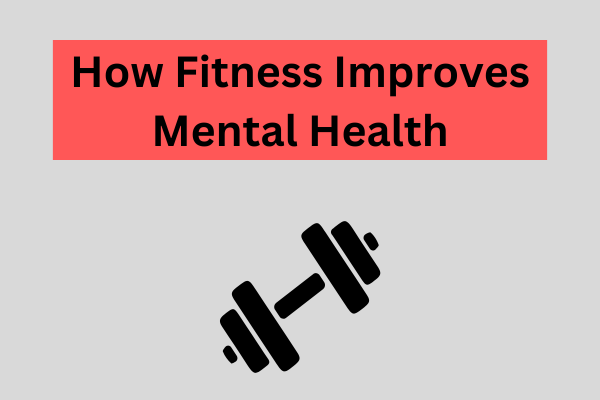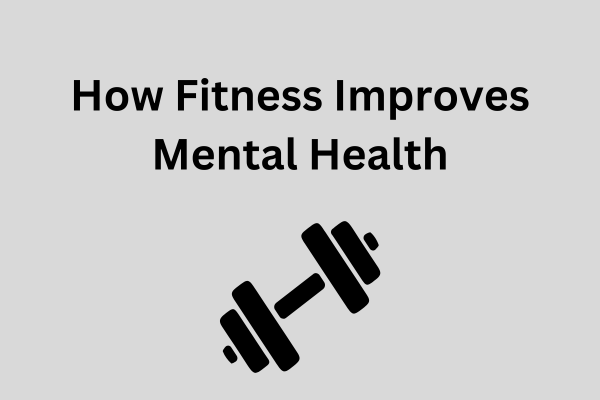How Fitness Improves Mental Health
In the bustling rhythm of modern life, taking care of our mental health has become a priority more than ever. Amidst the myriad strategies available, one potent and holistic approach stands out: fitness. Engaging in regular physical activity isn’t just about sculpting a well-toned body; it also wields the power to uplift our mental well-being. This article delves into the profound link between fitness and mental health, exploring the mechanisms at play, answering common questions, and shedding light on the transformative potential that lies within our reach.
How Fitness Improves Mental Health: The Science Behind Fitness and Mental Health
The intricate relationship between our bodies and minds is an ever-expanding field of research, with mounting evidence showcasing the positive impact of exercise on mental health. Engaging in physical activity triggers a release of endorphins, often referred to as the “feel-good” hormones. These endorphins interact with the brain’s receptors, reducing the perception of pain while also creating a sense of euphoria. Consequently, this natural high can alleviate symptoms of anxiety and depression, and even serve as a preventive measure against these conditions.
Beyond endorphins, exercise has the ability to alter brain chemistry in other ways. Regular workouts stimulate the production of neurotransmitters like serotonin and dopamine, both of which are closely associated with mood regulation. An increase in these neurotransmitters contributes to a more stable emotional state, thus reducing the likelihood of experiencing mood disorders. Furthermore, exercise encourages the growth of new neurons, particularly in the hippocampus – a brain region linked to memory and learning – thereby enhancing cognitive function and resilience to stress.
The Holistic Transformation: Fitness and Mental Health
Engaging in regular physical activity isn’t just a remedy; it’s a lifestyle choice that permeates every facet of our being. Consider it a holistic transformation that encompasses not only physical strength but also mental resilience. The positive effects of exercise ripple through our lives, contributing to enhanced self-esteem and body image. As we set and achieve fitness goals, we cultivate a sense of accomplishment that transcends the gym and seeps into our daily lives, fostering a more positive outlook.
Moreover, the routine and discipline that come with a fitness regimen can have a profound impact on mental health. Establishing a consistent exercise routine fosters a sense of control, an essential element in managing anxiety and depression. The commitment to regular workouts instills a feeling of purpose, combating feelings of listlessness and hopelessness that often accompany mental health challenges.
Sleep, a cornerstone of mental well-being, also reaps the rewards of physical activity. Regular exercise improves sleep quality, helping individuals fall asleep faster and enjoy deeper rest. This, in turn, contributes to overall mental clarity and emotional stability.
FAQs About How Fitness Improves Mental Health:
1. How much exercise is needed to see mental health benefits?
The ideal amount of exercise varies, but guidelines generally recommend at least 150 minutes of moderate aerobic activity or 75 minutes of vigorous activity per week, coupled with muscle-strengthening activities on two or more days.
2. Can any form of exercise yield mental health benefits?
Absolutely. Whether it’s walking, jogging, dancing, swimming, or engaging in team sports, any type of physical activity that gets your heart rate up can contribute to improved mental health.
3. Is there a connection between exercise and reduced stress?
Yes, indeed. Exercise helps regulate the body’s stress response by reducing the production of stress hormones like cortisol. Additionally, physical activity provides a healthy outlet for pent-up tension, promoting relaxation and emotional balance.
4. Can exercise replace traditional treatments for mental health conditions?
While exercise can be a valuable component of a holistic approach to mental health, it’s important to note that it might not entirely replace traditional treatments. Consultation with a healthcare professional is crucial for developing a comprehensive treatment plan.
5. Are the mental health benefits instantaneous?
Some effects, such as the mood-enhancing impact of endorphins, can be felt immediately after a workout. However, long-term benefits like improved self-esteem, stress reduction, and better sleep may take a few weeks of consistent exercise to manifest fully.
6. How much exercise for mental health benefits?
Aim for 150 minutes of moderate aerobic activity or 75 minutes of vigorous activity weekly, coupled with muscle-strengthening exercises.
7. Can any exercise help?
Yes, any activity that raises your heart rate is beneficial.
8. Exercise and stress reduction?
Exercise reduces stress hormones and provides a healthy outlet for tension.
9. Exercise as a replacement for mental health treatments?
It complements traditional treatments; consult professionals.
10. Instantaneous effects of exercise on mental health?
Some mood-enhancing effects are immediate; long-term benefits require consistency.
In a world where the pressures of life can weigh heavily, the path to better mental health might just be a jog, a swim, or a dance away. Embrace the transformative connection between fitness and mental well-being, and embark on a journey that promises not only a stronger body but a revitalized mind.
Conclusion: How Fitness Improves Mental Health
The synergy between fitness and mental health is undeniable. Engaging in regular physical activity catalyzes a cascade of positive effects, from the release of mood-enhancing chemicals to the reshaping of brain architecture. As the realms of physical health and mental well-being intertwine, the pursuit of fitness emerges as a formidable tool in our battle against anxiety, depression, and stress. Beyond its physiological benefits, exercise provides a profound sense of empowerment and control, offering a holistic transformation that radiates into every aspect of our lives. So, lace up those sneakers, hit the track, or unroll that yoga mat – your journey to a healthier body and mind begins with that crucial first step.
Visit the link to read more: https://family-fitness-fun.com/how-to-get-rid-of-ants-in-virtual-families-3-a-comprehensive-guide/





